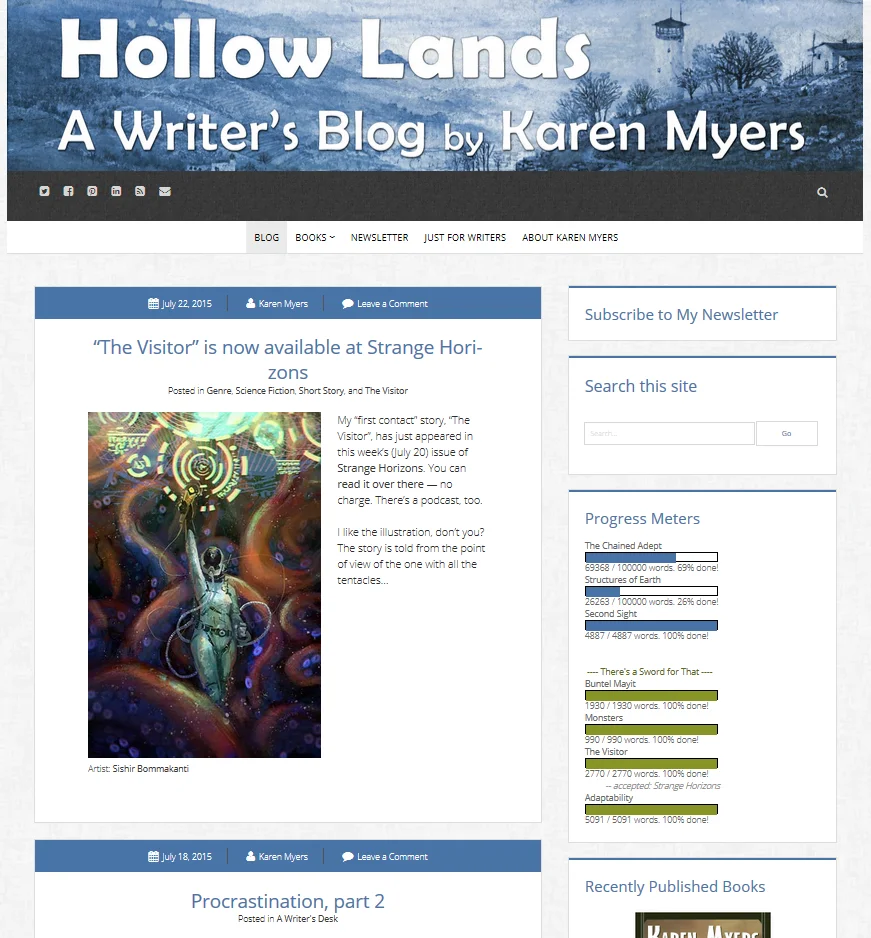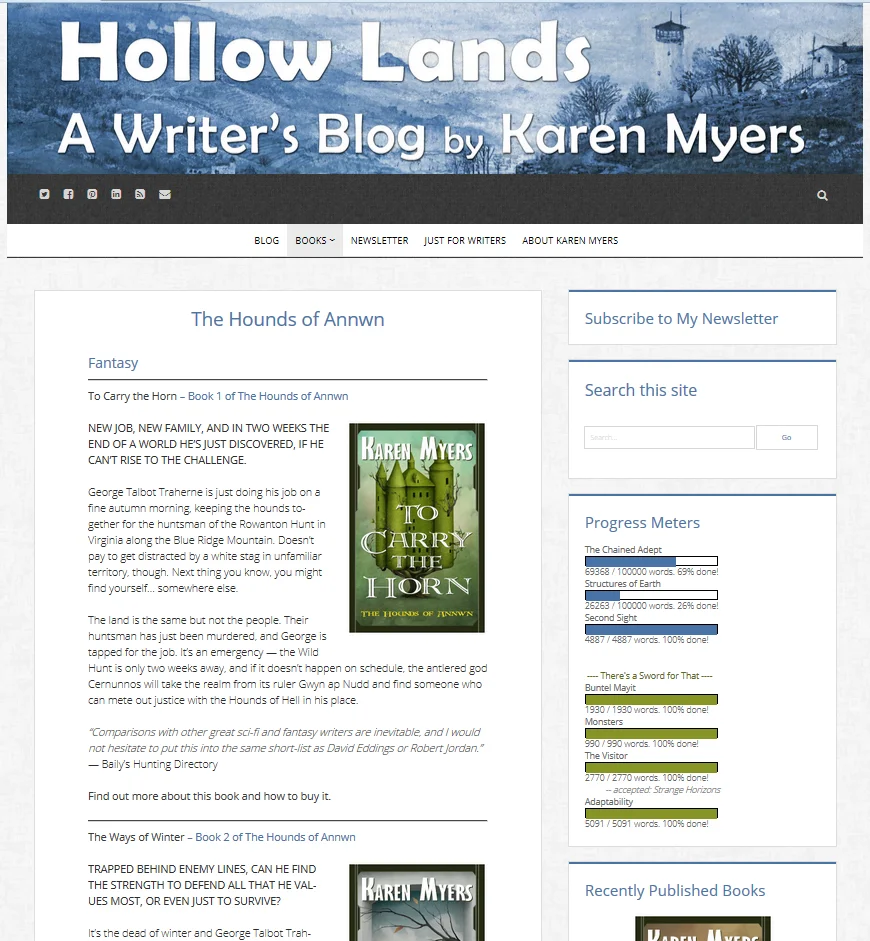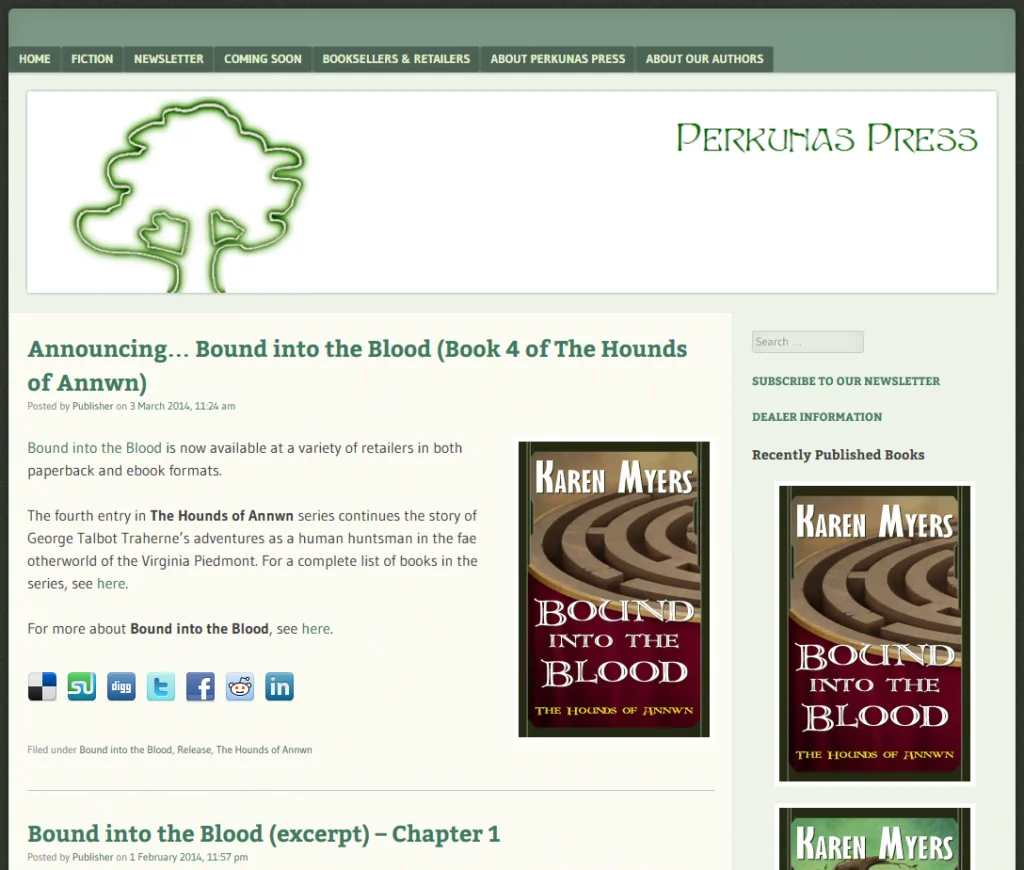With so many opportunities to reach readers provided by social media, is it really worth going to the time, trouble, and expense of setting up and maintaining a dedicated author website? Not only is it worthwhile, it's crucial, says self-published US novelist Karen Myers. Here she explains why, and offers her top tips on how to use yours to best effect.
Over time, I have evolved some firm opinions about what should be on author websites, having seen too many that look gorgeous but miss the point, frustrating readers and potential buyers. I’ve also seen plenty of authors use social media sites as pseudo-websites. Bad idea, when first you consider:
What is the point of an author website? To own and control all the information about your products so that you can tell readers what they want to know and turn them into fans who will buy your next book. Yet almost no-one builds their first Author website with that in mind and it can take quite a while for them to clarify what they’re doing with it.
Here’s how I think it should be done. (There’ll be a link at the end to a much more detailed discussion on my own author website, with helpful instructions on how to do some of the things I’m suggesting.)
Ownership
Your author website is the central point for all information about books & author. It must be owned and controlled by the author. It is your fundamental platform, and it belongs to you, and you don’t want to ever lose control over it. You have to own and control its domain name (URL) which, if possible, then should match your author name. You should also own its web hosting.
Software
Your site should be maintained in industry-standard software (WordPress is a common choice with many lovely templates). It must be mobile-friendly. Big companies can afford to hire techies to write and maintain custom websites — you can’t.
Budget
There’s no reason for any of this to cost much. I pay about $12/year for the HollowLands domain. I own about a dozen websites, and the cost of hosting all of them is well under $100/year. Each lets me set up unique email addresses (e.g., [email protected]) that I forward to my single primary personal email for convenience.
Expertise
If you don’t feel that you are capable of figuring out how to do this then call someone in to help you. The best help would be someone who sets you up in a standard environment like WordPress, instead of a custom-built one. That one-time cost is a trade-off for you acquiring the knowledge to do it yourself, and if they explain it well to you, you might become empowered to do your own support when the time comes.
Branding
All the “look-and-feel” of an author website is determined by the brand imagery. The actual template used (assuming WordPress) also matters, but it’s the images that people remember. Consider components such as the header, colours, fonts, photos, publisher imprint, covers, taglines, etc. It should match the branding you use elsewhere, e.g. newsletters, business cards, book covers, flyers, social media.
Funnelling
Your presence anywhere else on the web should funnel readers back to your website – Facebook pages, Amazon Author pages, Twitter and other secondary platforms. These are no substitute for your author website, no matter how many followers you have there, because you do not control them. Sites like Facebook already restrict how many of them see your messages without extra fees. You control the links that you put into your books. Those should go to your book’s page on your website, and that should never change. If you use URL shorteners like Bitly or TinyURL, remember that those businesses can go away and take your shortened links into oblivion with them.
Growth
Your author site should cater for more than just your debut book. You can have a dedicated book page on your general-purpose Author site, and a page for each series, too, so that a reader can easily see what else they might want to buy, but one-book sites are a bad idea and not what readers want.
Reader Focus
What do readers care about? Well, I can tell you what they don’t care about — the issue of independent author publishing vs traditional publishing. There is absolutely no point in making that part of your website’s message. I’m proud of being an indie, but why would I expect my readers to know or care about that? Be a professional, and look like one. Your Author site should be an indicator of quality, even if all you’ve published so far is one short story. Professional author websites have two things: information about their books, and links to their publisher. They might also have links to retailers and a blog and contact information, but not necessarily.
Publisher vs Author site
Virtually every independent author begins with a single site — an Author website — even if they’ve created a publisher imprint. I was no exception. It becomes awkward over time to put both the author and the publisher function into the same website. More importantly, that’s not how the professional publishers do it, and it’s not what bulk buyers expect. We want to indicate our professionalism by doing what other players in the industry do, because that’s what readers (and bulk buyers) expect. So consider setting up a separate publisher website, particularly if you have your own imprint. Mine is Perkunas Press and it doesn’t look like my author website in any way. The imprint has its own look-and-feel, and all the brand materials that go with that. The only people who go there are wholesalers, or anyone sent from my author website looking for more detailed purchasing information. It’s updated infrequently, just when new products are published. There are thousands of publisher websites like this for micro-presses, and yours can fit right in. If a bookstore looks you up (as a publisher) he shouldn’t think twice about ordering from you.
OVER TO YOU
Do you agree with Karen, or have you found a way to bypass the need of an author website while still making great sales? Please feel free to disagree – or to add further weight to Karen's argument.









[…] See also: What’s the point of an author website? […]
[…] to indie author, Karen Myers, an author website has two functions. First, it allows the author to control both their brand and product image […]
[…] Opinion: What’s the point of an author website? […]
[…] Opinion: What’s the point of an author website? […]
An intriguing discussion is worth comment. I believe that you should publish more about this issue,
it might not be a taboo matter but generally folks don’t talk
about such issues. To the next! Best wishes!!
[…] https://selfpublishingadvice.org/opinion-whats-the-point-of-an-author-website/ […]
I am finishing up the first book in my series of Nature photobooks for Children. I’d like to start my author website but am unsure how my publishing imprint works in getting orders to go to the printer where it would be distributed. This is a mystery to me and a real stumbling block to finishing my books. I expect to send my book files for Book I in the very near future to the printer (expect to use IngramSpark). If I get orders at my author website, how does it get to IngramS to be sent from them to the buyer? I am not a “teckkie” by any means, but am not afraid to tackle building a website with Word Press.
Where can I go to find out how to solve my dilemma?
Let me take a stab at what I think you’re asking.
Here’s how I would set something like that up.
Booksellers buy from companies like Ingram, using the suppliers they’re comfortable with. Createspace’s expanded distribution gets you into Ingram, and you can go to Ingram directly (there are reasons to do that, but you can start with Createspace).
Booksellers may also order directly from your Publisher site, if you make that easy for them and set up a standard discount schedule.
Individuals who come to you to buy your books will typically look on a Book page (on your author or publisher site) to see all the details and links to where your book is available. Then they can click on those links to buy the book.
Finally, you can also offer your own ecommerce link on the Book page so that the order comes directly to you, and you’re in charge of fulfillment. I suggest you leave that for a later version of your business as you get started.
[…] Opinion: What’s the point of an author website? […]
You can certainly see your enthusiasm within the article you write.
The world hopes for even more passionate writers
like you who are not afraid to mention how they believe. All the time go after your heart.
Thanks, Karen. Good points all, and I”m headed over to the longer article for more details. Branding (because I write in two completely different genres) and having a landing page instead of just my most recent blog are two things I already know I need to work on.
You make some really good points, Karen. Another reason to avoid shortened links is that people can’t tell where they’re being led. I suspect you mean that the cost for your domains is under $100 per year per domain. If you meant that all 12 or so are hosted for that amount I’d be interested in further details.
I’m a professional web development consultant specializing in assisting DIY webmasters so I encourage authors to visit my site (mhvirtual.com). You can receive a discount on my services by setting up hosting through my affiliate links or by buying a copy of the guide I wrote.
No, I mean $100 for all 12 (it was clumsily phrased). They offered a package deal for 10 websites. I believe some of their business is supporting re-packagers of hosting services.
http://www.hostica.com
This information was greatly appreciated. I am a new Author and this journey has been wild. I read one Author say he was like a turtle I must be his cousin the snail. None the less you words have boost me forward in my conquest to be the best.
Dear Karen Myers,
Personally, I agree absolutely with your point of view expressed in the article “What’s the point of an author website?”.
The article itself, is a honest, smart and useful expression, of thoughts and experience, of a person who, at least, ‘Knows Exactly What is saying’.
My opinion is that, to invent a way to bypass the need of an author website, is at least ‘dangerous’.
Sincerely,
Alexis Aronis at http://www.digiopti.net
Thanks for this, Karen. All of the information will be most helpful to authors just starting their websites as well as those of us more established. I’m looking into the challenges of making my website mobile-friendly at the moment. Will pop over to your website for you more detailed post on this.
Karen; Very timely. I am in the process of revamping my author site and the information you’ve provided will undoubtedly save me time and mistakes. Thanks. Plan to read the rest on your blog. I too use WordPress for both my blog and my publishing page, but have seriously thought about hosting my site at Bluehost so that I can take advantage of the WordPress plug-in and the ability to monetize directly from my website. I was wondering if you had done the same?
I don’t know Bluehost. I’m on Hostica and WordPress is one of their standard environments. I use a simple eCommerce package (Gumroad) at the moment, but stepping up to a more serious eCommerce package is on my list.
I enjoyed reading this article and the info tips suggested.
I am not a published author and most likely will never be.
I prefer to think of myself as a turtle, eventually getting to where I want to be.
I don’t agree though with using my name as my author website as I see nearly all of those authors listed in Romance Writers Of America do.
I felt a website name was better because if they google the topic, western frontier books, my website will pop-up.
But few if any readers looking on a search engine for a western frontier book would think of typing my name on the web, let alone even know it.
Perhaps I am wrong.
I feel like a child barely learning to walk compared to all of the other members here who are established, successful authors.
That said, I am proud to be a writer, proud to have written 22 eBooks and prouder still to have had the guts to put them out on the web for all to see and hopefully enjoy.
I have much to learn and hope to be around long enough to be a better writer.
Raymond
I speak to the issue of Author Name vs Conceptual Name in the expanded version of the article here: http://hollowlands.com/2015/07/whats-the-point-of-an-author-website/ I use a conceptual name myself (HollowLands.com) because my personal name is so common.
Raymond, if you’ve written and published 22 e-books, you ARE a published author. Say it 50 times a day, say it to other people, and OWN IT! No matter how many books or short stories we’ve published, we’re all still trying to write better and do a better job of marketing. You are a writer, you are an author, you just need to believe it!
Wonderful article! Every author should read this before setting up their website.
One item I would have liked to see mentioned is the importance of a mailing list. A mailing list is one of the most valuable marketing assets you can build, as it lets you advertise promotions, announce new releases, and reconnect with fans for free.
Some pros feel that mailing list signups are even more important than a sale, because the sale is a one-shot deal, whereas the mailing list signup provides you with ongoing marketing opportunities.
I cover Marketing and mailing lists on the 4th page of the expanded version of the article on my site: http://hollowlands.com/2015/07/whats-the-point-of-an-author-website/
For all those who have their book(s) published through iTunes iConnect aka iBooks you can create your own personalised link maker, auto link maker, widget, banner or even RSS Generator for your website at https://linkmaker.itunes.apple.com/en-us/
Good points, I’m revamping my site at the moment (new book coming out in 2 weeks) and am adding a page for journalists too ie authors photos in different res, answers to questions, blurbs in different lengths etc.
Hi Lorna:
I wish you the best of success.
Raymond